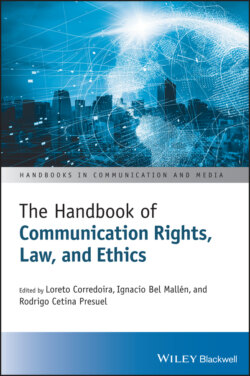Читать книгу The Handbook of Communication Rights, Law, and Ethics - Группа авторов - Страница 14
The Existence of Freedom Prior to Rights and States
ОглавлениеFrom the moment in history when communication rights began to be restricted – I refer here to the first formulations of these rights, such as “the freedom to print” or “freedom of press” (Virginia Declaration of Rights of 1776) – a fight for unconditional freedom of expression began. In many cases, it would prove a difficult battle. During this long period, all political structures tended to limit the freedoms of their citizens, particularly in the area of information, in terms of both what could be said (speech) and what could be published (the press). This was done in the service of the ruling classes and was a product of their lack of understanding. They believed themselves to be the exclusive holders of these freedoms and to be the ones vested with the power to concede these freedoms – with limitations – on citizens. A clear example of this is seen in absolute monarchies in Europe. If we understand freedom to be, in the words of Castro Fariña, “the absence of barriers” (Castro Fariñas 1970, pp. 31–44) then absolute monarchs established a broad range of barriers to freedom of expression.
As the years passed and Western states began to form in the eighteenth and nineteenth centuries, it appeared that the situation would improve because positive declarations of rights appeared, and these promoted the freedom of citizens as a basic principle. During this period, constitutions made the effort to include freedom, albeit in general terms, as one of their basic principles. While the emergence of states promoted citizens’ freedoms in one sense, it also severely delayed the arrival of the era of human rights.
This reflects a crude reality. States, which conceded certain freedoms to citizens, limited those freedoms in pursuit of their own interests, and these limitations were not always legal or consistent with citizens’ rights. Up until the twentieth century, states ignored the idea that the concept of freedom, as a fundamental human attribute, clearly precedes the creation of political structures. Indeed, states thought that they were the first to grant freedom to people and, therefore, had the right to define and limit that freedom in a way that suited their political and social goals. And so, they codified and enshrined the concept of freedom into their laws and into the first constitutions.
This perception posed a challenge to individual rights because states understood freedom not as a reality existing prior to the creation of states – or, indeed, as something intrinsic to all human beings – but instead as an attribute created and established by the state. Not even Thomas Paine’s ideas in his work The Rights of Man (1791) had much impact at first, despite his great influence on the United States’ declaration of independence. Paine argued that the rights of man are innate and precede all else: “The Revolutions of America and France are a renovation of the natural order of things, a system of principles as universal as truth and the existence of man, and combining moral with political happiness and national prosperity.”
In the Spanish and Latin American contexts, Francisco de Vitoria is also considered a pioneer, as previously mentioned, when it comes to the communication rights that we enjoy now.1 He asked the Spanish Crown for “just titles” (a version of innate rights) for the peoples of Spanish America at the beginning of the sixteenth century. When the New Laws of the Indies were promulgated in 1542, they drew on de Vitoria’s views on human rights and policy.
This allowed the state to limit freedom when it felt that such freedom was not being exercised along lines that served the state’s interests. The problem during this historical period is that the state, which conceived and defined freedom under specific circumstances, could limit that freedom until it no longer existed. What was the root cause of this? Put quite simply: the act of basing freedom on the state rather than on human beings.
This gave rise in subsequent centuries, principally the nineteenth and twentieth, to laws and even constitutions that, on paper, were clearly liberal but that in their daily implementation supported dictatorships in which the exercise of freedom was non existent – for example, Sweden’s 1991 law on freedom of expression, which is one of the four fundamental laws that comprise the country’s constitution, or the Dutch reformed constitution of 2018. This illustrates the conservative concept of freedom subjugated to the political idea of order.
Clearly, this situation had negative consequences on the consolidation of all rights, including communication rights. The idea that human rights are a positive and complementary consequence of the exercise of human freedom is incorrect. Freedom per se is a way to exercise rights, and it neither precedes nor follows from rights. Rather, freedom is an attribute of rights. No right can be exercised without freedom. And there is an even more important idea at work: human rights, which allow humankind to fulfill its existential needs, precede the existence of states and are rooted in the human condition itself. Rights are innate to humans: they are born with a person and belong entirely to that person until the moment of their death.
